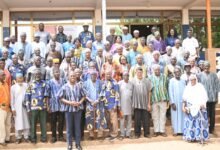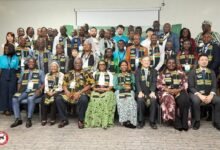Integrate sustainability as strategy in devt agenda-GHATOF

The Ghana Tourism Federation (GHATOF) has called on the governments to integrate sustainability as a strategy in the development agenda of the country and not an afterthought process.
The Vice President of the Federation, Mr Kwasi Eyison, made the call at the maiden Delegates Conference on Tourism, COVID-19 and the Environment, organised by Earth Rights Ghana (NGO) in partnership with the Ghana Tourism Authority (GTA) in Accra on Wednesday.
He also applauded the government on the skills development initiatives under the Compact for Post-Covid Transformation and the digitalisation drive through the e-governance for efficiency and effectiveness.
Mr Eyison cautioned against the intermittent refrain of “network is down syndrome” which ground digital network operations to a halt common with digitalised services in both public and private sector operations.
“GHATOF equally commended government for the GH¢55 million COVID-19 response Small Medium Enterprises (SME) grant to support businesses in the tourism and hospitality sector.
According to him the conference had come at the correct time since nations all over the world were taken the appropriate and relevant steps towards easing of restrictions, amid the rise of the delta strain of COVID-19.
Giving the impact of the pandemic on global GDP, he said research had shown that tourism dropped from 10.4 per cent in 2019 to 5.5 per cent in 2020, meaning, “a figure of USD9,170 billion dropped to USD4,671 billion.
“A total Travel &Tour (T&T) GDP drop from 334m in 2019 to 272m jobs in 2020. A change of -61.6m representing -18.5 per cent drop”, he said.
Mr Eyison said, in Ghana, the total contribution of T&T to GDP dropped from 5.9 per cent in 2019 to 2.9 per cent in 2020, representing a change of -49.7 per cent drop of USD3.7 billion to USD1.87 billion.
Mr Richard Kilson, Board Chairman of Boti Falls Eco-Tourism Centre, also called for aggressive policy redirection and prioritisation in the area of hard and soft infrastructure investments such as networks and internet connectivity and improvement and redevelopment of tourist attractions.
According to him, infrastructural development within the tourism industry was impossible to escape from the development of other economic sectors, such as agriculture and food systems, construction, energy and health.
He mentioned some of the problems associated with sustainability as water pollution and scarcity, environmental degradation, waste and sanitation, deforestation which were also a threat to the hospitality industry.
Mr Kilson, therefore, called for a concerted effort to incorporate sustainability practices in tourism operations and also policy plans on skills development to enhance visitor and tourist experience in the era of new world of work.
BY SAMUEL OPARE LARTEY





